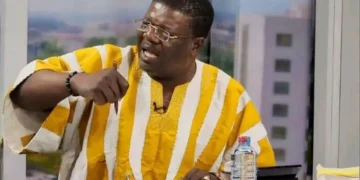Majority Chief Whip, Rockson Nelson Dafeamekpor, has called on journalists to intensify their role as watchdogs in the fight against corruption across Africa.
Delivering an address on behalf of the Majority Leader at the 9th Biennial Conference of the African Parliamentarians Network Against Corruption (APNAC), held on Friday, November 7 at the Alisa Hotel in Accra, Mr. Dafeamekpor described the media as a crucial pillar of democracy and an indispensable partner in ensuring transparency and accountability in governance.
“As part of this call to action, we encourage the Fourth Estate to become a crucial pillar of our democracy and our drive to ensure that anti-corruption activities become pervasive in our public space. We therefore urge you to pursue investigative journalism with rigor and responsibility, to shine a searchlight into the dark corners where corruption thrives, hold us accountable, but do so with accuracy and a commitment to public interest, not sensationalism,” he said.
Mr. Dafeamekpor emphasized that fighting corruption should not be the responsibility of governments alone, calling for stronger collaboration between parliamentarians, civil society, academia, and the media.
He explained that repositioning APNAC’s role required “forging stronger, more strategic alliances” across these sectors to ensure lasting impact.
He also urged Members of Parliament (MPs) across Africa to become “corruption watchdogs” in their respective constituencies and nations.
According to him, legislators must use their parliamentary oversight tools such as questions, motions, and statements to keep the executive in check, while also educating their constituents on their rights and how to report corruption.
The Majority Chief Whip further underscored the role of civil society and academia, stressing that these groups must remain active participants in the anti-corruption process.
He called on researchers and policy experts to provide evidence-based studies that could guide legislative reforms and strengthen anti-corruption measures across the continent.
“Men in academia and civil society must provide us, as elected representatives of the people, with evidence-based research that informs better policy and legislation,” he said, adding that critical academic articles should not be seen as attacks but as constructive tools for national development.
Mr. Dafeamekpor urged all stakeholders to transform discussions into action.
“Our governments cannot do this alone, we must each take responsibility and work collectively to build transparent and accountable societies,” he added.


















